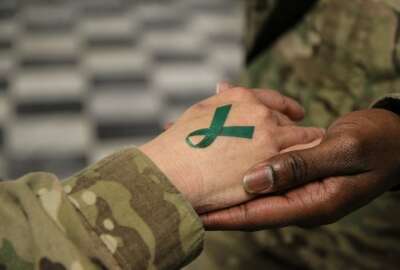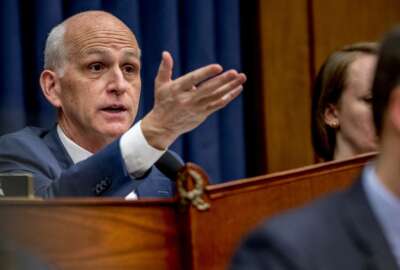
The Army just appointed its first lead trial counsel, with big implications
The Army recently appointed its first ever lead trial counsel, a Senate-confirmed one-star general. Her job will be to prosecute cases of murder, rape and sexual...
The Army recently appointed its first ever lead trial counsel, a Senate-confirmed one-star general. Her job will be to prosecute cases of murder, rape and sexual assaults. It is all part of a new legal framework for such cases. For analysis, the Federal Drive with Tom Temin talked to former Air Force judge advocate general and founding attorney of JAG Defense, Grover Baxley.
Interview transcript:
Tom Temin
We mentioned the army. But this is something that all of the military armed services are doing?Grover Baxley
That’s correct. The National Defense Authorization Act of 2022, require that every service appoint a one-star [Judge Advocate General (JAG)] to serve as the special trial counsel. And so every service will have this office setup.Tom Temin
And was this kind of a compromise between having those types of cases murder, rape, sexual assault, taken out of the military chain altogether? Versus the way it was done before? Is this a middle ground type of measure?Grover Baxley
That’s exactly what happened. There’s been a big push from certain members of Congress to change the entire military justice system to shift the authority to prosecute criminally under the [Uniform Code of Military Justice (UCMJ)]. All military offenses from commanders, that is whatever we call convening authority. Those are senior officers flag and general officers, depending on the service. And shift that into a civilianization, so to speak, of our military justice system where everything is handled by civilian prosecutors.Tom Temin
And what would the implications of that had been? What did the military not like about that general idea of just taking it out and civilianizing it, as you say?Grover Baxley
Well, military commanders traditionally have been responsible for upholding morale, cohesion, readiness for duty and military effectiveness of their units. And from their perspective a big part of that is, maintaining good order and discipline through the use of the UCMJ. And what they were concerned about is that if that authority is withheld from them, that it will have a negative effect on their ability to command their units.Tom Temin
So then what was the problem? I’m asking you to look at it from the people’s point of view that were pressing for this. With respect to these types of cases. It was not the cases themselves, but in some instances, the rank of the people committing them? Or was it something about this type of violent case itself, that was the problem?Grover Baxley
There has been a growing concern by lawmakers and the public that the military was not, quote unquote, tough enough on sexual assault allegations. And they are concerned that military commanders are not prosecuting cases aggressively enough, that they’re not obtaining enough convictions. And that as a result, sexual assault remains a rampant problem in the military. Whether that’s true or not, that’s the concern that led to these changes. Again, the initial idea was to withdraw all prosecutorial authority from commanders and put it in the hands of civilians. Instead, what will happen is that only certain covered offenses, as they’re called, will be withheld from commanders. And they will include things like sexual assault, murder, and various other serious offenses. Minor offenses, traditional military offenses will remain within the purview of the commanders.Tom Temin
And from your active duty days, what was your perception of how these types of cases were disposed of? Did it seem biased one way or the other from your experience?Grover Baxley
Again, this is what I refer to as a perceived sexual assault crisis in the military. It keeps going round and round, where civilians are unhappy with how military commanders are handling sexual assault cases. They want more prosecutions. So as a result, commanders are taking weaker and weaker cases to trial to satisfy these lawmakers. And as a result, there are fewer and fewer convictions and the conviction rate goes down. And it’s a vicious cycle. These lawmakers believe that, withdrawing that authority from the commanders and putting it in the hands of a career prosecutor will increase the conviction rate in the military. A lot of people like me think the opposite is true. That the seasoned prosecutors will be looking at these cases and not taking them to trial as much as the commanders were. The reason for that, is the commanders were doing what the lawmakers wanted. Because at the end of the day, the commander’s want to make sure they continue to get promoted and to make the lawmakers happy. They were taking every case, every allegation that was made of a sexual assault nature, and prosecuting it. And as a result, the conviction rate was very, very low.Tom Temin
We’re speaking with Grover Baxley. He’s former Air Force Judge Advocate General, and founding attorney at a firm JAG Defense. And how do you envision this working now in practice? The special counsels that have been appointed in the military branches, are nevertheless uniformed officers of that branch. So will they have no connection to the JAG offices and somehow have an independent counsel office? But don’t they have to worry about their own kind of future careers too in the military? They’re only one star. They may want two, three or four?Grover Baxley
That’s a great point. And it’s a question that I think has yet to be answered, as to whether or not this is going to be a terminal position for the JAGs that accept it. As you said, it’s not just a one star, that’s a very high ranking position. But theoretically, these are individuals that were on a career track to potentially be two or three stars, being the highest rank that a JAG can attain. And so yes, there could still be political ramifications for these individuals, if lawmakers are not satisfied with the conviction results that they obtained.Tom Temin
And what will be the mechanism do you envision by which the cases will come to them? Something happens, someone makes an allegation of rape, sexual assault, whatever the covered offense might be. And by the way, what are the covered offenses?Grover Baxley
There’s a long list. I don’t think your listeners are going want me to list every article under the UCMJ. But they include murder, manslaughter, rape, other sexual misconduct, domestic violence, stalking, and sexual harassment is one that’s a little bit up in the air right now.Tom Temin
All right. So getting back to the question of how this will operate. If an allegation is made, then it will face a fork in the track. Going one way to the JAG, one way to the special counsel. Who decides that?Grover Baxley
What will happen is if there’s an allegation involving any covered offense. The former convening authority, that is the senior officers of that command, will be required to forward the allegation and any report of an investigation to the Office of the Special Trial Counsel. The convening authority, the senior officers will be allowed to offer input as to what they think should happen with the allegation. But ultimately, it’ll be up to the Office of the Special Trial Counsel to determine whether or not charges are going to be preferred and referred against the accused.Tom Temin
Will the special counsels report up functionally through the JAG? Or do they have a separate reporting function?Grover Baxley
They will be reporting up to TJAG. The Judge Advocate General for each service.Tom Temin
Right. So in some sense, they’re still connected to the JAG colleagues.Grover Baxley
Correct.Tom Temin
Wow. I’m trying to picture in my mind then what’s really going to change here, with respect to defendants and plaintiffs?Grover Baxley
Well, what’s really been flipped on its head is previously, if there was an allegation made, it would be up to the convening authority. That is a flag or a general officer as to what to do with the allegation. And they alone had the authority to do that, they would accept advice from the JAG. But that was the extent of it. The JAG could give them advice, and ultimately was the commander’s decision. And what’s again flipped on its head now is, it’s just the opposite. Now, the JAG, well actually the Office of the Special Trial Counsel. A JAG will be making the decision, the convening authority can make recommendations and offer input. But ultimately, the JAG gets to decide what will happen with the case.Tom Temin
In other words, they created sort of a super JAG, with more decision making discretion than the standard JAG here.Grover Baxley
Correct.Tom Temin
All right, how do you think it’s gonna work? I think you might have stated that already. But maybe just to reiterate. Do you think this will be successful? And I guess the question is what is successful?Grover Baxley
That’s exactly right. What is successful? If success is defined as higher conviction rates and/or more conviction, because I think that’s ultimately what lawmakers are looking for, a more convictions. I think you’re going see just the opposite. Because now you have a seasoned JAG, a seasoned lawyer evaluating the merits of the case and deciding whether or not the evidence is sufficient to obtain a conviction. And what we see as district attorneys acting. Where they’re evaluate whether or not they can get a conviction. And that’s all they’re focused on. And they’re not worried about, well if I don’t prosecute it, I’m not going to get promoted. I think you’re gonna see fewer cases go to trial. You may see a higher conviction rate, but I think you’re gonna see fewer cases and fewer convictions overall.
Copyright © 2025 Federal News Network. All rights reserved. This website is not intended for users located within the European Economic Area.
Tom Temin is host of the Federal Drive and has been providing insight on federal technology and management issues for more than 30 years.
Follow @tteminWFED
Related Stories






